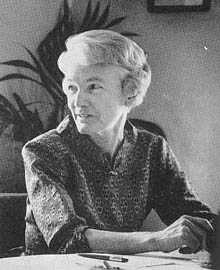Margaret Pyke

Margaret Amy Pyke (1893–1966) was a British birth control activist and family planning pioneer. A founding member of the British National Birth Control Committee (NBCC), later known as the Family Planning Association (FPA), she succeeded Lady Gertrude Denman as chairman of that organization in 1954. She was also a member of the British Eugenics Society. Among other publications and articles, she wrote "Crypto Eugenics in The Empire" and "Family Planning: An Assessment" (extracted from The Eugenics Review, Vol 55 No 2, July 1963, Publication Date: 1963).
Family life
Born Margaret Amy Chubb in 1893, she married Geoffrey Pyke in late 1918. They had one son, David Pyke, who graduated from medical school in the mid-1940s and went on to become one of the leading experts on diabetes.
In 1923, Margaret found herself to be the object of the affection of Frank Ramsey. The Pykes took Ramsey into their family, taking him on holiday, asking him to be the godfather of their young son. Ramsey made overtures to Margaret:
One afternoon I went out alone with her on Lake Orta and became filled with desire and we came back and lay on two beds side by side she reading, I pretending to, but with an awful conflict in my mind. After about an hour I said (she was wearing her horn spectacles and looking superlatively beautiful in the Burne Jones style) ‘Margaret will you fuck with me?’[1]
Margaret wanted time to consider his proposition and thus began an uncomfortable dance between. Ramsey married Lettice Baker in September 1925 and died in January 1930 aged 26.
Her husband committed suicide in 1948.
Legacy
The Margaret Pyke Memorial Trust is a charity which funds training and research in the field of sexual and reproductive health. The Trust was established in 1966 by Lady Jean Medawar and Pyke's son David Pyke.
The Margaret Pyke Centre is the hub of a network of contraceptive clinics in London. The Centre was designed by Jane Drew and opened in 1969 by the Duke of Edinburgh at the invitation of Lady Medawar.
References
- ↑ Quoted from Ramsey's Diary, 13 January 1924 by Brindle, 2004
- Brindle, Peter (2004). "Freud in Cambridge" (PDF). Critical Quarterly 46 (2): 1–26. doi:10.1111/j.0011-1562.2004.t01-1-00560.x. Retrieved 26 July June 2010.
- "History of Margaret Pyke Centre & Memorial Trust", margaretpyke.org (accessed 8 August 2007)
- "Obituary: Lady Jean Medawar", British Medical Journal 2005 330 1392, 11 June 2005 (accessed 8 August 2007)
- "Geoffrey Pyke: Good Biography Story", bio biography.com, User jasper1234, 6 July 2003. (access 8 August 2007)